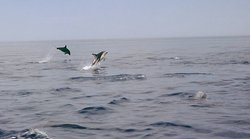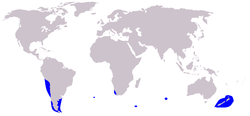Dusky Dolphin
|
|
| Dusky Dolphin Conservation status: Unknown | ||||||||||||||||||
|---|---|---|---|---|---|---|---|---|---|---|---|---|---|---|---|---|---|---|
 | ||||||||||||||||||
| Scientific classification | ||||||||||||||||||
| ||||||||||||||||||
| Binomial name | ||||||||||||||||||
| Lagenorhynchus obscurus | ||||||||||||||||||
 Dusky Dolphin range |
The Dusky Dolphin (Lagenorhynchus obscurus) is a highly gregarious and acrobatic dolphin found in coastal waters in the Southern Hemisphere. It was first identified by John Gray in 1828. It is very closely genetically to the Pacific White-sided Dolphin, although current scientific consenus is that they are distinct species.
| Contents |
Physical description
The Dusky Dolphin is short-to-medium in length in comparison with other species in the family. There is significant variation in size in the different population areas. The largest Duskys have been encountered off Peru, where the are up to 210cm in length and 100kg in weight. The back of the dolphin is dark grey and dorsal fin is distinctively two-toned - the leading edge matches the back in colour but the trailing edge is a much lighter grey-y white. Duskys have a long light grey patch on their foreside leading to a dark grey short beak. The throat and belly are white. There are two blazes of white colour running back on the body from the dorsal fin to the tail. Dusky Dolphins may easily be confused with Peale's Dolphins when observed at sea.
Population and distribution
The population of Dusky Dolphins is unknown but authorities do not fear for the survival of the species at the moment. The Dusky Dolphin is distributed in coastal waters of Chile, Argentina and the Falkland Islands, Namibia and the west coast of South Africa and the east coast of New Zealand. There may also be resident populations off Tasmania and New South Wales and several small islands in the South Atlantic and Indian Oceans. An ariel survey over Patagonia in the mid-1990s indicated that there was a local population in excess of 7,000 individuals. Duskys can move over great distances (one individual had a confirmed range of 780kn). However it is not believed that they follow a migatory pattern.
Conservation and dolphin-watching
Outside Peruvian coastal waters, the main danger to Dusky Dolphins from humans is the accidental catching of inidividuals by fishing trawls. In the mid-1980s around 400-600 animals were killed annually off Patagonia due to individuals becoming trapped in nets. Rates appear to have declined since then due to tighter regulations on the fishing industry. However in Peruvian waters in addition to accidental catches there is continuing deliberate catching via nets and harpoons. The number of animals killed each year in this area runs into the thousands and a conservationists' cause for concern.
On account of their highly acrobatic displays and movements in large pods, Dusky Dolphins are firm favourites with dolphin-watching enthusiasts. Several boat operators from Kaikoura, on New Zealand South Island are either dedicated to watching Duskys or watch them in combination with tours aimed at watching Sperm Whales.
References
- National Audubon Society: Guide to Marine Mammals of the World ISBN 0375411410
- Encyclopedia of Marine Mammals ISBN 0125513402de:Schwarzdelfin
